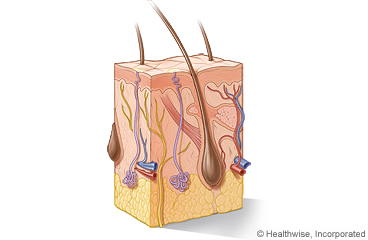Cellulitis: Care Instructions
Your Care Instructions

Cellulitis is a skin infection caused by bacteria, most often strep or staph. It often occurs after a break
in the skin from a scrape, cut, bite, or puncture, or after a rash.
Cellulitis may be treated without doing tests to find out what caused it. But your doctor may do tests, if
needed, to look for a specific bacteria, like methicillin-resistant Staphylococcus aureus (MRSA).
The doctor has checked you carefully, but problems can develop later. If you notice any problems or new
symptoms, get medical treatment right away.
Follow-up care is a key part of your treatment and safety. Be sure to make and go to all
appointments, and call your doctor if you are having problems. It's also a good idea to know your test results
and keep a list of the medicines you take.
How can you care for yourself at home?
-
Take your antibiotics as directed. Do not stop taking them just because you feel better. You need to take
the full course of antibiotics.
-
Prop up the infected area on pillows to reduce pain and swelling. Try to keep the area above the level of
your heart as often as you can.
-
If your doctor told you how to care for your wound, follow your doctor's instructions. If you did not get
instructions, follow this general advice:
-
Wash the wound with clean water 2 times a day. Don't use hydrogen peroxide or alcohol, which can slow
healing.
-
You may cover the wound with a thin layer of petroleum jelly, such as Vaseline, and a nonstick
bandage.
-
Apply more petroleum jelly and replace the bandage as needed.
-
Be safe with medicines. Take pain medicines exactly as directed.
-
If the doctor gave you a prescription medicine for pain, take it as prescribed.
-
If you are not taking a prescription pain medicine, ask your doctor if you can take an
over-the-counter medicine.
To prevent cellulitis in the future
-
Try to prevent cuts, scrapes, or other injuries to your skin. Cellulitis most often occurs where there is
a break in the skin.
-
If you get a scrape, cut, mild burn, or bite, wash the wound with clean water as soon as you can to help
avoid infection. Don't use hydrogen peroxide or alcohol, which can slow healing.
-
If you have swelling in your legs (edema), support stockings and good skin care may help prevent leg sores
and cellulitis.
-
Take care of your feet, especially if you have diabetes or other conditions that increase the risk of
infection. Wear shoes and socks. Do not go barefoot. If you have athlete's foot or other skin problems on
your feet, talk to your doctor about how to treat them.
When should you call for help?
 Call your
doctor now or seek immediate medical care if:
Call your
doctor now or seek immediate medical care if:
Watch closely for changes in your health, and be sure to contact your doctor if:
Current as of: November 16, 2023
Content Version: 14.0
Care instructions adapted under license by your
healthcare professional. If you have questions about a medical condition or this instruction, always ask
your healthcare professional. Healthwise, Incorporated disclaims any warranty or liability for your use of
this information.